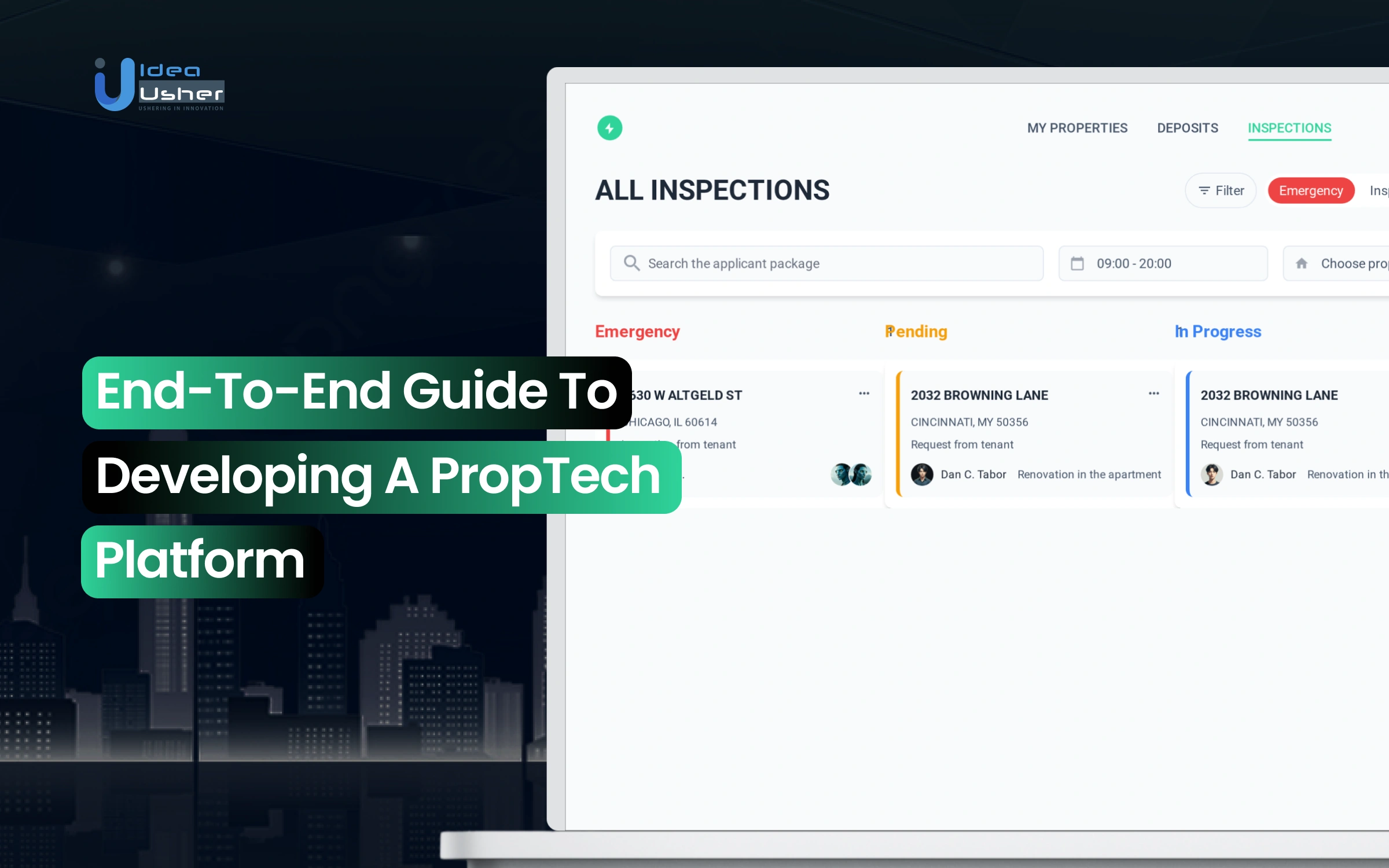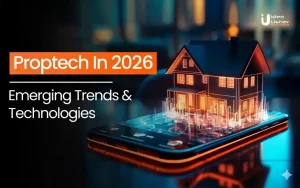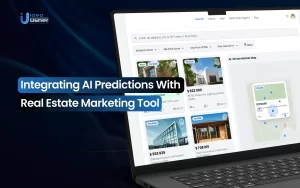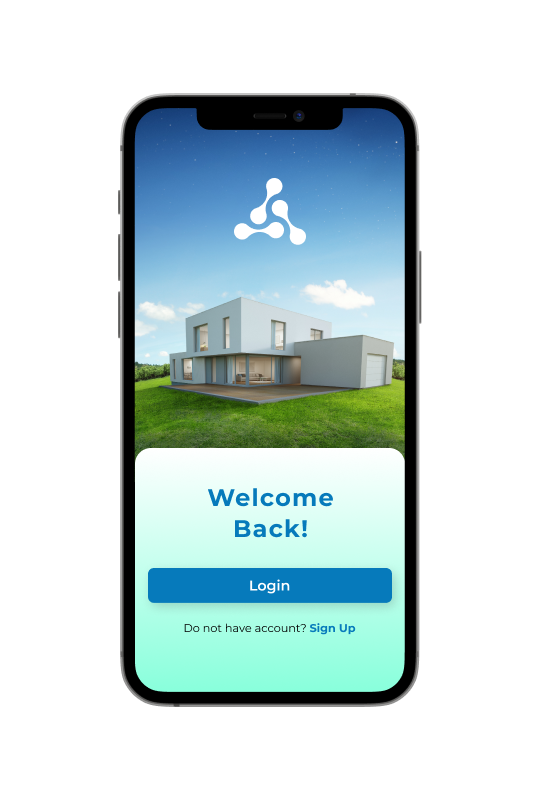Traditional real estate often faces problems like slow deal closures, unclear processes, confusing paperwork, and inconsistent communication. Whether you are buying a home, renting an office, or managing tenants, the experience can feel slow and outdated. A PropTech platform helps solve these issues by using data, automation, and digital tools to make things easier for both property owners and buyers.
PropTech platforms are bringing together technology and real estate know-how to change the way the industry works. From online property searches and AI-powered valuations to virtual tours and easier tenant management, these platforms are making property transactions more transparent, efficient, and focused on the customer.
In this blog, we’ll guide you step by step through building a PropTech platform, starting with the initial idea and ending with the launch. You’ll discover the key features, recommended technology, and a clear development plan to help your solution succeed in the digital real estate market. IdeaUsher combines cross-industry AI expertise with PropTech knowledge, turning ideas into scalable, market-ready platforms that drive sustainable growth and lasting impact in digital real estate.
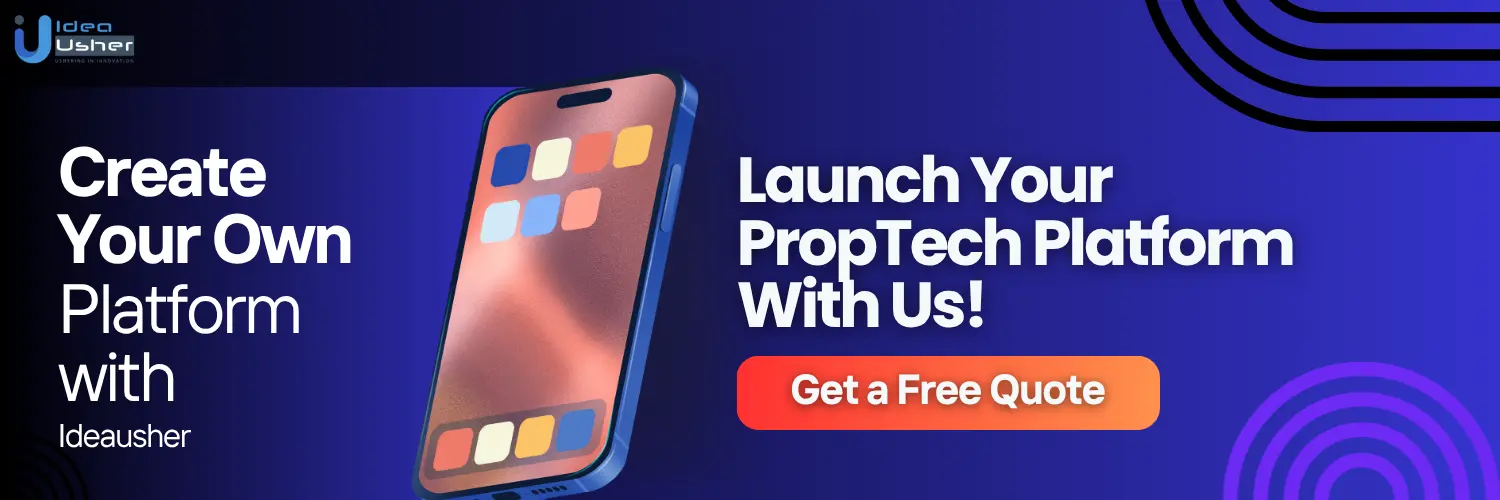
What is a PropTech Platform?
A PropTech platform uses software, data, and automation to improve real estate processes like listing, management, investment, and tenant services. It connects buyers, sellers, investors, landlords, and service providers via online marketplaces, virtual tours, smart building integration, and management tools, boosting efficiency, transparency, and decision-making.
Here’s a breakdown of the main functions a PropTech Platform does:
- Property Listing and Discovery: PropTech platforms are online marketplaces for property owners, agents, and developers to list sale or rent properties. Users can search, filter, and compare based on location, price, size, and amenities, simplifying property discovery.
- Virtual Property Tours: Many PropTech platforms offer virtual tours with 360-degree photography or videos, enabling remote property exploration. This saves time and boosts accessibility, especially for long-distance or international clients.
- AI-Assisted Property Valuation: Advanced PropTech platforms use AI to analyze market trends, sales, and property features to estimate value, aiding buyers, sellers, and investors in making data-driven decisions and fair negotiations.
- Tenant and Lease Management: PropTech platforms assist landlords and managers with daily tasks like tracking rent, managing leases, handling maintenance, and tenant communication in one digital system.
How a PropTech Platform Works?
A PropTech platform uses technology to streamline real estate, connecting buyers, sellers, investors, and property managers. It combines search, management, transactions, and analytics to improve efficiency, transparency, and user experience.

1. User Onboarding
Users create accounts by providing personal details, preferences, and contact information. The platform may perform verification checks to ensure security and build trust. This step helps tailor property recommendations and interactions to each user’s needs.
2. Property Listing & Data Input
Property owners list their properties with key details like location, size, price, amenities, and images or videos. Advanced platforms often feature 3D tours or virtual visualization for remote evaluation. Standardized data allows for accurate search and comparison.
3. Search, Discovery & Matching
Users can search for properties using filters like location, price, type, or size. AI-powered algorithms or recommendation engines match users with properties suited to their preferences, improving the chances of finding the right property quickly.
4. Communication & Interaction
The platform provides messaging tools, scheduling features, and virtual tours for users to interact with property owners or agents. This ensures seamless communication, clarifies details, and facilitates property visits.
5. Transaction & Payment
PropTech platforms often handle online offers, bookings, rent collection, or investment payments. Secure payment gateways, digital contracts, and e-signatures streamline transactions while reducing paperwork and delays.
6. Property Management & Maintenance
Landlords and managers can track rent payments, maintenance requests, and tenant communications. Integration with IoT devices or smart building systems allows real-time monitoring of energy use, security, and property performance.
7. Analytics & Insights
Platforms collect and analyze data on market trends, property valuations, occupancy, and user behavior. Insights help users make informed investment or rental decisions, while also enabling the platform to optimize property recommendations.
8. Feedback & Continuous Improvement
Users provide ratings, reviews, and feedback, which help improve credibility and trust. The platform uses this information to refine algorithms, enhance user experience, and continuously optimize features.
Why PropTech Platforms Are Rising in the Real Estate Industry?
The PropTech market was valued at USD 25,145.1 million in 2021 and is expected to reach USD 94,200.07 million by 2030, growing at a 15.8% CAGR from 2022 to 2030. This growth is driven by digitalization, demand for smart buildings, and AI and IoT adoption.

The PropTech sector has witnessed significant investment activity in recent years. In 2024, the total dollar volume of investments increased by 32.5%, and the average deal size rose by 12%, despite a 15% decrease in the number of deals compared to 2023.
Notable platforms include:
- HouseEazy, a resale home marketplace, raised $16.8 million in a round led by Accel, with contributions from Chiratae Ventures, Antler, and several venture debt funds.
- Sunday PropTech, backed by global travel-tech company PRISM, secured ₹50 crore (approximately $6 million) from a consortium led by InCred and Analah.
- Zazume, a Spanish PropTech specializing in AI-driven rental management, closed a €2.3 million funding round led by Sabadell Venture Capital and Nordstar.
The rise of the PropTech platform development is reshaping the real estate industry by introducing technological innovations that enhance efficiency, transparency, and accessibility. With continued investment and adoption, PropTech is poised to play a pivotal role in the future of real estate.

How PropTech Is Transforming the Real Estate Industry?
PropTech (Property Technology) is revolutionizing how properties are listed, managed, bought, sold, and rented. Leveraging AI, big data, cloud computing, and IoT makes real estate operations faster, more transparent, and data-driven.
1. Smarter Property Search & Discovery
Advanced AI and analytics enable users to find properties tailored to their needs, using filters like budget, commute time, amenities, and lifestyle preferences. Map-based search, virtual tours, and AR/VR walkthroughs save time and improve decision-making for buyers and renters.
2. Data-Driven Investment Insights
PropTech platforms collect and analyze real estate data to provide market trends, price forecasts, and ROI predictions. Investors can make informed decisions, optimize property portfolios, and anticipate emerging high-demand locations with greater accuracy.
3. Enhanced Efficiency for Agents & Brokers
Digital dashboards, automated lead management, and CRM integrations help agents manage multiple listings, track client interactions, and close deals faster. Automation reduces repetitive tasks, allowing professionals to focus on high-value activities.
4. Improved Transparency & Trust
Secure digital transactions, e-signatures, and real-time documentation improve transparency between buyers, sellers, and tenants. Users can access verified property histories, pricing trends, and compliance records, reducing disputes and building confidence.
5. Smart Property Management
IoT-enabled buildings and AI-driven maintenance predictions allow property managers to monitor energy usage, schedule repairs, and optimize tenant experiences. Predictive maintenance reduces costs and prevents system failures in commercial and residential properties.
6. Remote Access & Virtual Transactions
PropTech allows users to browse, tour and even finalize property deals remotely, which is especially valuable for international buyers or urban tenants. Virtual platforms reduce physical visits, accelerate transactions, and expand market reach.
Key Features to Consider in a PropTech Platform
A successful PropTech platform development relies on features that enhance user experience, streamline operations, and drive engagement. This section highlights the essential functionalities to include when designing a robust and competitive platform.

1. Smart Property Listing Management
PropTech platforms make property listings easier by using AI for data entry, image recognition, and smart tagging. Agents and owners upload details, and the system fills in key information like location, price range, and amenities. This cuts down on manual work and mistakes.
2. Advanced Property Search & Filtering
AI-powered search helps users find properties using detailed filters such as budget, distance to schools, commute time, or lifestyle needs. Some platforms also offer voice or map-based search, making the process more intuitive.
3. Virtual Tours & 3D Visualization
Immersive 3D property tours and AR/VR walkthroughs allow users to explore properties remotely. This not only saves time but also boosts engagement and conversion rates, particularly for international or out-of-town buyers.
4. Dynamic Pricing & Valuation Tools
AI looks at past data, demand trends and local market factors to suggest fair property prices. Dynamic pricing tools let agents and owners set competitive rates quickly, which helps properties sell faster and keeps pricing clear.
5. Automated Lead Management & CRM Integration
Integrated CRM systems handle interactions between buyers and sellers, automate follow-ups, and rate leads based on their interest. This way, no potential customer is overlooked and real estate professionals can work more efficiently.
6. Secure Digital Payments
The platform allows buyers, tenants, and agents to make secure digital payments through trusted gateways and multi-factor authentication. Automated digital agreements and e-signatures simplify bookings, rent payments, and deposits, reducing paperwork, errors, and increasing transparency.
7. Tenant & Lease Management
Property managers can track lease agreements, rent collection, maintenance requests, and renewals from a unified dashboard. Automated reminders and payment analytics improve tenant satisfaction and reduce delays.
8. Predictive Maintenance & IoT Integration
IoT sensors and AI can predict when equipment might fail, track energy use, and schedule maintenance before problems happen. This helps assets last longer and cuts operating costs, which is especially useful in commercial real estate.
9. Market Analytics & Investment Insights
Dashboards that use data give insights into market trends, property values, occupancy rates, and returns on investment. Investors rely on these tools to manage their portfolios and make quick market forecasts.
10. Compliance & Document Management
Digital verification tools make sure documents such as land titles, lease agreements, and ownership records follow legal standards. Automated KYC and compliance checks make property transactions and regulatory steps easier.

End-to-End Guide to Develop a PropTech Platform
A PropTech platform development combines real estate expertise with technology to create seamless, user-friendly solutions. This guide covers developing a platform that transforms property management, buying, and selling.

1. Consultation and Requirement Analysis
We begin by understanding your business model like property listing, rental management, brokerage, or investment analytics. We identify your main users like agents, buyers, and landlords, and highlight essential integrations such as CRM and payments, ensuring your platform meets your goals and PropTech requirements.
2. UI/UX Strategy and Wireframing
Our designers create user-friendly interfaces that help people find and explore properties easily. We make navigation simple, offer map browsing, and provide tailored search filters. Our wireframes reflect real user journeys so buyers, whether first-time or repeat, can access the property info they need.
3. Architecture Design and Tech Stack Finalization
We use scalable cloud infrastructure and modular architecture to support dynamic listings, user sessions, and real-time updates. At this stage, we also add AI and analytics tools, which will allow us to build features like predictive property pricing, automated lead scoring, and smart recommendation engines.
4. Core Platform Development
Our developers build core functionalities including property management dashboards, agent-buyer matching systems, and digital payment integration. AI algorithms are embedded to personalize property recommendations, detect duplicate or fraudulent listings, and analyze market trends in real time.
5. Integration of Smart Technologies
We integrate smart data analytics, IoT for smart home insights, and AR/VR tours to make user experiences more engaging. Our predictive models look at location trends, amenities, and price history to give useful insights to buyers and property managers.
6. Quality Assurance and Compliance Testing
Every module undergoes functional, usability, and security testing to ensure reliability. We comply with real estate regulations (RERA, GDPR) and data protection standards. AI-driven testing tools are used to detect anomalies and ensure performance under heavy user loads.
7. Deployment and Optimization
Once approved, the platform is deployed on cloud servers with CI/CD pipelines for continuous updates. Post-launch, our team monitors usage analytics and user behavior patterns to optimize performance, refine AI recommendations, and enhance UX.
8. Continuous Support and Feature Upgrades
We provide ongoing support to maintain platform scalability and introduce new-age capabilities such as voice-assisted search, AI chatbots for property queries, and predictive maintenance for rental properties.
Cost to Build a PropTech Platform
The cost for a PropTech platform development can vary widely based on features, technology stack, and development approach. This section breaks down the key factors that influence pricing and helps estimate a realistic budget for your project.
| Development Phase | Description | Estimated Cost |
| Consultation | Research market, define goals, core features, and compliance needs. | $5,000 – $10,000 |
| UI/UX Strategy | Design wireframes and prototypes for smooth navigation and user experience. | $7,000 – $12,000 |
| Architecture Design & Tech Stack | Plan system architecture, tech stack, scalability, and third-party integrations. | $8,000 – $14,000 |
| Core Platform Development | Develop key features such as listings, search, booking, payments, and dashboards. | $16,000 – $30,000 |
| Integration of Smart Technologies | Add AI/ML, IoT, virtual tours, and analytics for enhanced property insights. | $20,000 – $35,000 |
| QA Testing | Test functionality, performance, security, and ensure regulatory compliance. | $5,000 – $10,000 |
| Deployment and Optimization | Launch platform on cloud, optimize performance, and implement monitoring. | $5,000 – $9,000 |
| Continuous Support | Maintain platform, provide support, and add feature enhancements over time. | $10,000 – $14,000 |
Total Estimated Cost: $60,000 – $125,000
Note: This is an estimated cost breakdown to provide clarity on the investment required for PropTech platform development. Consult with IdeaUsher for tailored guidance and development support to bring your platform vision to life.
Recommended Tech Stack for PropTech Platform
Choosing the right tech stack is essential for a scalable, secure, and high-performing PropTech platform development. This section covers recommended technologies and tools to effectively power your platform.
1. Frontend
React and Angular are ideal for web apps, providing dynamic and responsive layouts. Flutter or React Native enable cross-platform mobile development for iOS and Android, ensuring consistency across devices.
2. Backend
The backend handles data processing, business logic, and API management. Node.js allows fast, scalable server-side development, while Django offers robust architecture and security features. Both support RESTful and GraphQL APIs for flexible integrations.
3. Database
PostgreSQL is used for structured data such as listings, users, and transactions. MongoDB handles unstructured data like images, property documents, and analytics logs. These provide scalability and reliable performance for large datasets.
4. Cloud & Hosting
Cloud providers like AWS, Azure, or Google Cloud Platform (GCP) host the platform with auto-scaling, load balancing, and high availability. Cloud storage and CDN services ensure fast content delivery and disaster recovery.
5. Smart Technology Integration
AI/ML frameworks like TensorFlow or PyTorch power analytics, price prediction, and recommendation engines. IoT frameworks and APIs enable smart property monitoring and automation features.
6. Video & Virtual Tours
WebRTC, Agora, or Twilio SDKs provide real-time video calls for virtual property tours. Integration with 3D/AR visualization tools enhances property viewing experiences.

Challenges & How to Overcome Them?
A PropTech platform development comes with unique challenges, from integrating complex data systems to ensuring a smooth user experience. This section explores common obstacles and practical strategies to overcome them effectively.
1. Data Management and Integration
Challenge: PropTech platforms deal with huge volumes of property, user, and transaction data from multiple sources. Integrating MLS databases, municipal records, user-generated listings, and IoT devices can be complex.
Solution: We design centralized, scalable databases with ETL pipelines and APIs to ensure seamless data ingestion, synchronization, and real-time updates across all modules.
2. Ensuring Platform Security
Challenge: Real estate platforms handle sensitive financial, personal, and property ownership data, making them targets for cyberattacks.
Solution: We implement end-to-end encryption, multi-factor authentication, and secure payment gateways, along with role-based access control to safeguard user data and maintain trust.
3. AI Model Accuracy and Personalization
Challenge: Recommendation engines, predictive pricing, or property valuation algorithms can underperform if trained on incomplete or biased datasets.
Solution: Our AI models are trained on clean, diverse datasets and continuously updated with real-time market data. Predictive analytics ensure accurate property valuations and personalized user recommendations.
4. Payment and Transaction Reliability
Challenge: Processing bookings, rent payments, and deposits requires high reliability and minimal errors.
Solution: We integrate trusted payment gateways with automated confirmations and provide transparent dashboards for users and property managers, reducing disputes and improving trust.
Real-World Examples of PropTech Platforms Transforming Real Estate
PropTech is transforming real estate via digitized processes like buying, selling, management, and construction. From AI home valuations to 3D virtual tours, these platforms reshape property interactions. Here are five top examples fueling this change.
1. Zillow
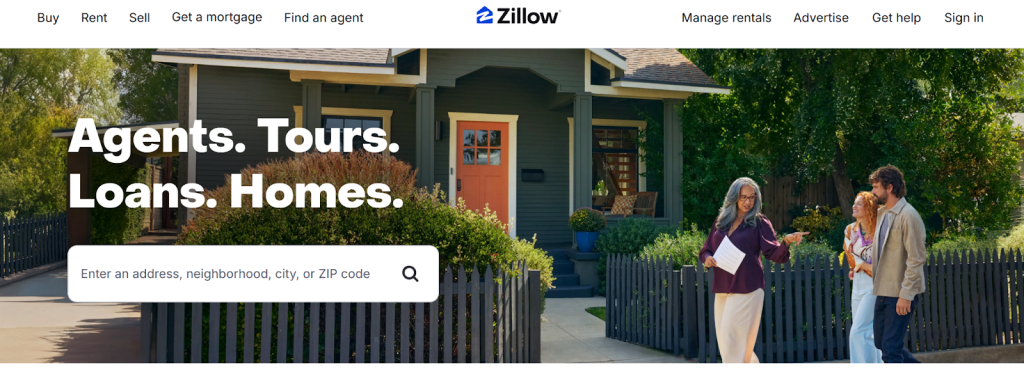
Zillow is a leading real estate marketplace offering listings, virtual tours, and its AI-powered home value estimator, Zestimate. It provides transparent property data, mortgage tools, and insights that simplify the home-buying process for millions of users worldwide.
2. Opendoor
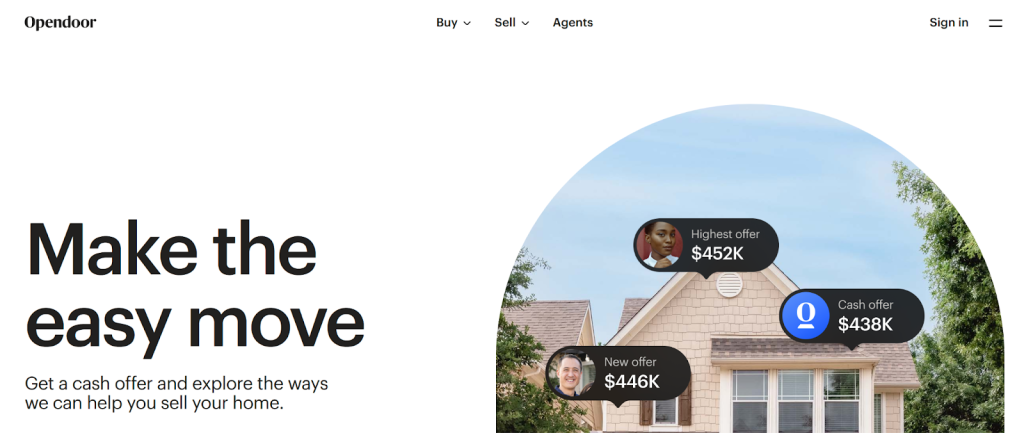
Opendoor uses AI and data analytics to make instant cash offers on homes, allowing sellers to skip listings and close deals quickly. Its iBuyer model streamlines home transactions, offering a fast, transparent, and hassle-free selling experience.
3. Matterport
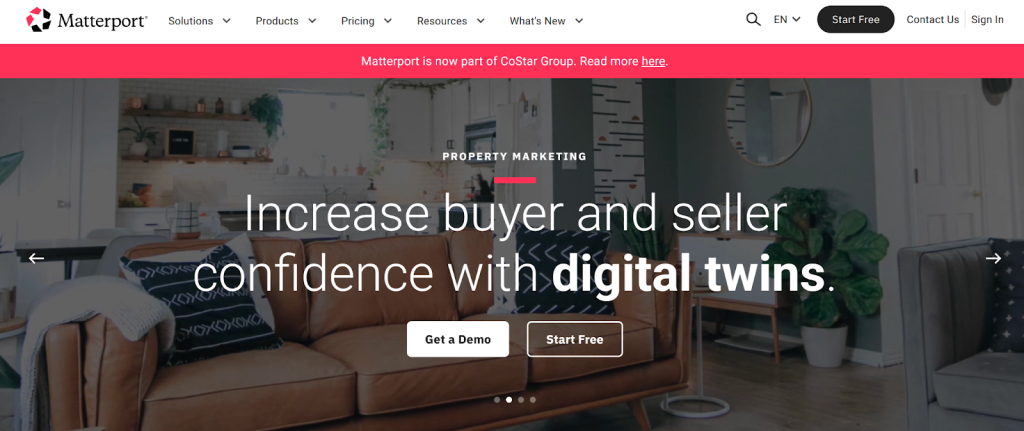
Matterport enables immersive 3D virtual tours using advanced scanning technology. By creating digital twins of physical spaces, it helps agents, sellers, and buyers explore properties remotely, improving marketing, collaboration, and engagement across real estate projects.
4. Knotel

Knotel is a global PropTech firm that provides customizable, flexible office spaces for growing businesses. It offers tailored, branded environments and uses technology-driven management and analytics to optimize space and productivity, making it a leader in flexible workspaces.
5. HoloBuilder
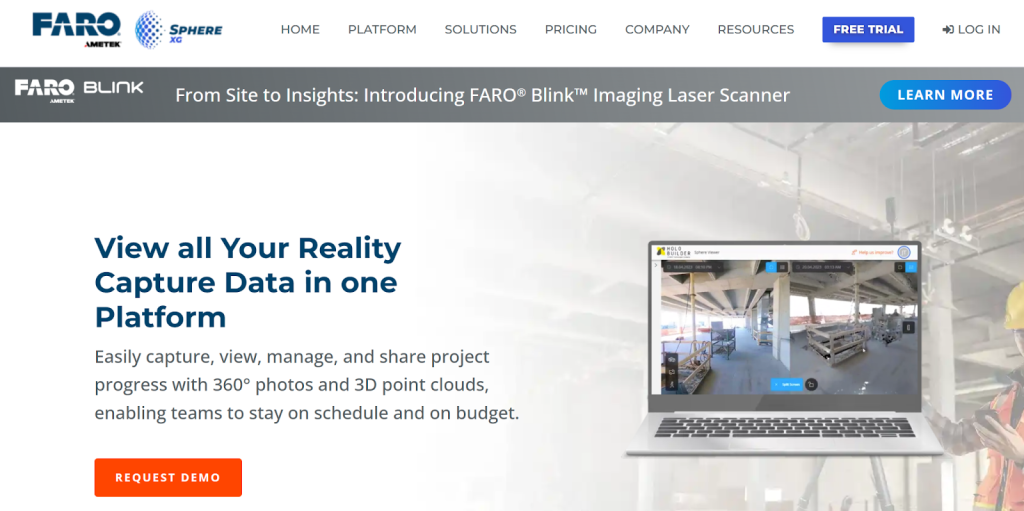
HoloBuilder simplifies construction management with 360° photo documentation and AI-powered progress tracking. It allows teams to monitor projects remotely, ensuring transparency, efficiency, and collaboration across every stage of property development.
Conclusion
Developing a successful PropTech platform requires careful planning, the right technology, and a clear understanding of user needs. By focusing on functionality, scalability, and seamless user experience, businesses can create solutions that transform how real estate services operate. PropTech platform development involves integrating data-driven insights, secure transactions, and intuitive interfaces to meet market demands effectively. When executed thoughtfully, such platforms not only streamline property management and transactions but also deliver long-term value to users, investors, and stakeholders, ensuring a competitive edge in the evolving real estate landscape.
Why Choose IdeaUsher for Your PropTech Platform Development?
IdeaUsher has extensive experience in PropTech platform development that simplifies property management, improves user engagement, and drives digital transformation in real estate. We help founders and investors turn their ideas into scalable, market-ready solutions.
Why Work with Us?
- PropTech Expertise: Our team delivers innovative solutions that streamline real estate operations and enhance user experiences.
- Custom Development: From conceptualization to launch, we provide fully tailored platforms for your business needs.
- Advanced Tech Stack: We implement modern, secure, and scalable technologies that support growth.
- Proven Success: We help clients build platforms that attract users, increase engagement, and maximize ROI.
See our portfolio to understand how we bring numerous enterprise ideas to life across industries.
Contact us today for a free consultation and start building your digital real estate platform.
Work with Ex-MAANG developers to build next-gen apps schedule your consultation now
FAQs
A PropTech platform should offer property listing management, virtual tours, tenant management, payment processing, analytics dashboards, and communication tools to connect landlords, tenants, and investors efficiently within a secure digital ecosystem.
They provide real-time analytics, property performance tracking, and portfolio management tools. Investors can make informed decisions faster, monitor ROI, and identify high-value properties efficiently within a digital ecosystem.
AI helps automate property valuations, predict market trends, optimize pricing, and personalize user recommendations. This enhances decision-making, improves customer experience, and boosts operational efficiency for real estate businesses.
By offering digital communication tools, maintenance request tracking, online payments, and seamless property search experiences. This transparency and convenience foster trust and long-term engagement between tenants and property managers.


